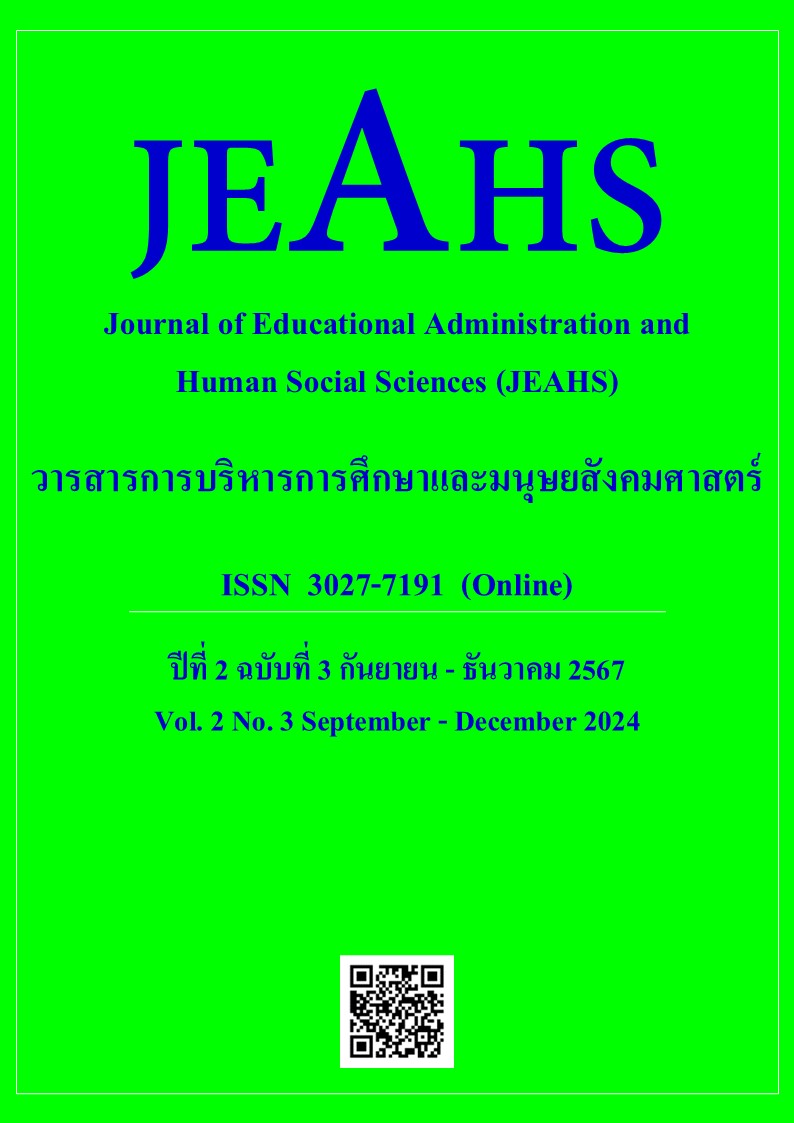BUDDHIST PRINCIPLES AND STUDENT SUPPORT SYSTEMS IN 21ST CENTURY EDUCATIONAL INSTITUTIONS
Main Article Content
Abstract
Student support systems play an important role in supporting student success. When combining with the application of Buddhist principles which is the 4 Iddhipāda principles (Basis for success) to connect with various educational theories, it shows a concrete application in the student care and support system; Chanda (Satisfaction) inspires learning through creating an environment that is conducive to learning and counseling that builds self-confidence and perseverance. Viriya (Perseverance) cultivates a commitment to learning through promoting practical learning and counseling to develop skills in dealing with obstacles. Citta (Intention) promotes concentration and willingness to learn through challenging activities and practicing meditation and Vimas (Contemplation) promotes analytical thinking and evaluation through encouraging students to ask questions and counseling that focuses on reflection on the integration of the 4 Iddhipāda (Basis for success) into the student care and support systems. It will help teachers and educational personnel to have a clear conceptual framework and guidelines for taking care of students effectively leading to the development of students' quality of life in an all-round way and creating a learning society that is happy and caring for everyone. This will lead to further development of the quality of education in Thailand.
Article Details

This work is licensed under a Creative Commons Attribution-NonCommercial-NoDerivatives 4.0 International License.
บทความที่ส่งมาขอรับการตีพิมพ์ในวารสารวารสารการบริหารการศึกษาและมนุษยสังคมศาสตร์ จะต้องไม่เคยตีพิมพ์หรืออยู่ระหว่างการพิจารณาจากผู้ทรงคุณวุฒิเพื่อตีพิมพ์ในวารสารอื่น รวมทั้งผู้เขียนจะต้องคำนึงถึงจริยธรรมการวิจัย ไม่ละเมิดหรือคัดลอกผลงานของผู้อื่นมาเป็นของตนเอง ซึ่งทางวารสารได้กำหนดความซ้ำของผลงานด้วยโปรแกรม CopyCat เว็บ Thaijo ในระดับ ไม่เกิน 25%
ในกรณีที่ บทความวิจัยมีกระบวนการวิจัยเกี่ยวข้องกับมนุษย์ ผู้นิพนธ์จะต้องส่งหลักฐานการรับรองจริยธรรมการวิจัยในมนุษย์มาประกอบการลงตีพิมพ์ด้วยจึงจะได้รับการพิจารณาลงตีพิมพ์ในวารสาร
ผู้เขียนบทความจะต้องปฏิบัติตามหลักเกณฑ์การเสนอบทความเพื่อตีพิมพ์ในวารสารการบริหารการศึกษาและมนุษยสังคมศาสตร์ รวมทั้งระบบการอ้างอิงต้องเป็นไปตามหลักเกณฑ์ของวารสารการบริหารการศึกษาและมนุษยสังคมศาสตร์ โดยรวมทั้งทัศนะและความคิดเห็นที่ปรากฏในบทความในวารสารการบริหารการศึกษาและมนุษยสังคมศาสตร์ ถือเป็นความรับผิดชอบของผู้เขียนบทความนั้น และไม่ถือเป็นทัศนะและความรับผิดชอบของกองบรรณาธิการวารสารการบริหารการศึกษาและมนุษยสังคมศาสตร์ และวารสารการบริหารการศึกษาและมนุษยสังคมศาสตร์
References
กระทรวงศึกษาธิการ. (2563). พระราชบัญญัติการศึกษาแห่งชาติ (ฉบับที่ 2) พ.ศ. 2545. แหล่งที่มา https://www.moe.go.th/backend/wp-content/uploads/2020/10/3.-พระราชบัญญัติการศึกษาแห่งชาติพ.ศ.2542-ฉ.2.pdf สืบค้นเมื่อ 7 สิงหาคม 2567.
จักรกฤษณ์ โพดาพล. (2563). รูปแบบการใช้ฉันทะจากหลักธรรมอิทธิบาท 4 เพื่อส่งเสริมการเรียนรู้ในศตวรรษที่ 21 ของนักเรียนโรงเรียนพระปริยัติธรรมแผนกสามัญศึกษา จังหวัดเลย. วารสารวิชาการธรรมทรรศน์. 20(2). 1-11.
ทรูปลูกปัญญา. (2563). ทฤษฎีการเรียนรู้ที่มีอิทธิพลต่อการเรียนการสอนในปัจจุบัน. แหล่งที่มา https://www.trueplookpanya .com /education /content/78212/-teaartedu-teaart. สืบค้นเมื่อ 7 สิงหาคม 2567.
พระพรหมคุณาภรณ์ (ป. อ. ปยุตฺโต). (2558). พจนานุกรมพุทธศาสน์ ฉบับประมวลธรรม. พิมพ์ครั้งที่ 30. กรุงเทพมหานคร: มูลนิธิธรรมทานกุศลจิต.
ภัทราวุธ มีทรัพย์มั่น. (2556). การบริหารโดยใช้โรงเรียนเป็นฐานกับคุณภาพการจัดศึกษาของโรงเรียนขนาดเล็ก สังกัดสำนักงานเขตพื้นที่การศึกษาประถมศึกษากาญจนบุรี เขต 2. วิทยานิพนธ์ศึกษาศาสตรมหาบัณฑิต. มหาวิทยาลัยศิลปากร.
สถาบันวิจัยเพื่อการพัฒนาประเทศไทย. (2564). การศึกษาไทยในยุคดิสรัปชัน. กรุงเทพมหานคร: สถาบันวิจัยเพื่อการพัฒนาประเทศไทย.
สมชาย รัตนทองคำ. (2556). เอกสารประกอบการสอน 475 788 การสอนทางกายภาพบำบัด ภาคต้นปีการศึกษา 2556. แหล่งที่มา https://ams.kku.ac.th/aalearn/resource/edoc/tech/56web/4learn_edu56.pdf สืบค้นเมื่อ 7 สิงหาคม 2567.
สำนักงานคณะกรรมการการศึกษาขั้นพื้นฐาน. (2562). คู่มือการจัดระบบดูแลช่วยเหลือนักเรียน. กรุงเทพมหานคร: สำนักงานคณะกรรมการการศึกษาขั้นพื้นฐาน.
ศูนย์ความเป็นเลิศด้านการศึกษา. (2563). การพัฒนาคุณลักษณะอันพึงประสงค์ในนักเรียน. กรุงเทพมหานคร: ศูนย์ความเป็นเลิศด้านการศึกษา.
Baker, S. & Jones, W. (2020). Educational Support Theory: An Overview. New York: Academic Press.
Piaget, J. (1973). To Understand Is to Invent: The Future of Education. New York: Viking Press.
Rogers, C. (2016). On Becoming a Person: A Therapist's View of Psychotherapy. Boston: Houghton Mifflin Harcourt.
Schmidt, S. & Gannon, T. (2018). Developmental Counseling and Therapy. Chicago: University of Chicago Press.
Sugai, G. & Simonsen, B. (2022). Multi-Tiered Systems of Support: A Comprehensive Guide. Washington, DC: Office of Special Education Programs.
World Economic Forum. (2020). The Future of Jobs Report 2020. World Economic Forum.


